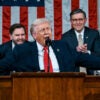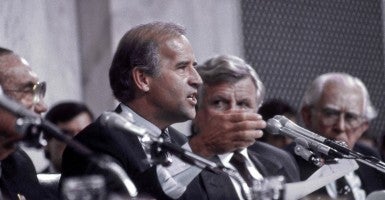Months before the 1992 presidential election, Joe Biden urged fellow U.S. senators to shut down the nomination process and block President George H.W. Bush’s judicial picks from a confirmation vote.
Today, Senate Judiciary Chairman Chuck Grassley, R-Iowa, called on the Senate to follow what he dubbed “the Biden Rules.”
The lawmakers should leave Antonin Scalia’s seat on the Supreme Court empty until a new president nominates a successor, Grassley said.
“It’s the principle, not the person,” Grassley argued, quoting at length from remarks made 24 years ago by Biden when the vice president was a senator from Delaware.
Grassley said the Judiciary Committee should listen to Biden’s reminder “of the Senate’s constitutional authority to provide, or withhold, consent, as the circumstances require.”
In a floor speech June 25, 1992, Sen. Joe Biden, then chairman of the Judiciary Committee, argued that senators “should seriously consider not scheduling confirmation hearings on [any Bush] nomination until after the political campaign season is over.”
It wouldn’t be prudent, Biden said, for Bush to nominate someone to the Supreme Court during what he predicted would be “one of the bitterest, dirtiest presidential campaigns we have seen in modern times.”
Arkansas Gov. Bill Clinton, a Democrat, would go on to defeat Bush, a Republican, in the November general election. And during all of that election year, according to records of roll call votes, the Senate confirmed only one circuit court judge.
Biden told his colleagues in 1992:
It is my view that if a Supreme Court justice resigns tomorrow, or within the next several weeks, or resigns at the end of the summer, President Bush should consider following the practice of a majority of his predecessors and not—and not—name a nominee until after the November election is completed.
For Bush to make a Supreme Court nomination during an election year would turn a nominee into a political football and do harm to the court, Biden argued:
Once the political season is under way, and it is, action on a Supreme Court nomination must be put off until after the election campaign is over. That is what is fair to the nominee and is central to the process.
Later in 1992, The New York Times reported that Democrats were trying to preserve judicial vacancies for Clinton to fill if he were elected president.
Grassley argued today that the Judiciary Committee should heed Biden’s reminder “of the Senate’s constitutional authority to provide, or withhold, consent, as the circumstances require.”
According to what Grassley called “the Biden Rules,” the Supreme Court can function smoothly without a full bench.
And rather than get into a nomination fight during an election year, the Senate ought to wait for the next president to fill the seat vacated when Scalia died Feb. 13.
Democrats argue that with more than 10 months remaining in office, President Obama has a right and a duty to name a successor to Scalia.
Grassley said Biden “was and remains a friend.”
In a closing shot, Grassley said if Obama makes a nomination, as is expected, Biden, “the man who sat at a desk across the aisle and at the back of the chamber for more than 35 years, knows what the Senate should do.”





























